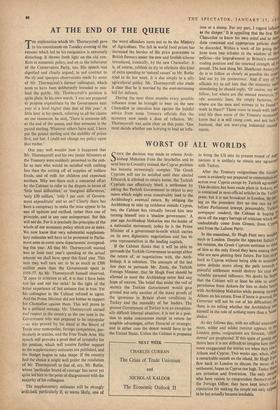WORST OF ALL WORLDS
C INCE the decision was made to release Arch- bishop bishop Makarios from the Seychelles and to send him to Coventry instead, the Cyprus problem has become increasingly complex. The Greek Cypriots will not be satisfied until their elected Ethnarch is allowed to return home; the Turkish Cypriots can effectively block a settlement by asking the Turkish Government to object to any move which might even conceivably lead to the Archbishop's eventual return. By obliging the Archbishop to take up residence outside Cyprus, too, the Cabinet has virtually forced him into turning himself into a 'shadow government.' A year ago Archbishop Makarios was the leader of a nationalist movement; today he is the Prime Minister of a government-in-exile which carries on its own diplomatic negotiations and has its own representatives in the leading capitals.
If the Cabinet thinks that it will be able to persuade the Turkish Government to accept either the return of, or negotiations with, the Arch- bishop, it is mistaken. The attempts of the last few days to persuade Mr. Zorlu, the Turkish Foreign Minister, that Sir Hugh Foot should be allowed to meet the Archbishop never had any hope of success. The belief that under the veil of secrecy the Turkish Government would give ground was only another of the many proofs of the ignorance in Britain about conditions in Turkey and the mentality of her leaders. The present Government of Turkey is in an exception- ally difficult internal situation; it is not in a posi- tion to make concessions except in return for tangible advantages, either financial or strategic; and in either case the donor would have to be the United States. Unless the Cabinet is prepared to bring the US into its present round of negCr tiations it is unlikely to obtain any agreeme with Turkey.
After the Treasury resignations the Goverly ment is evidently not prepared to contemplate a° action over Cyprus except by Turkish agreernelli This decision has been made plain in Ankara, aild ,. is contained in semi-official articles in the Turkish press; but it is not broadcast in London. By tell' ing on the precedent that no one can be told: before Parliament (except, presumably, Turkish newspaper readers), the Cabinet is hoping to stave off the angry barrage of criticism which W1P undoubtedly come from Greece, from CyI and from the Labour Party.
In the meantime, Sir Hugh Foot very sensibli stays in London. Despite the apparent failure °f his mission, the Greek Cypriots continue to thinl' of him as the only friend they have among those who are now plotting their future. For him to gc back to Cyprus without being able to announce some definite move along the path towards de peaceful settlement would destroy his rare all valuable personal influence. No doubt he hoPc5 that the Cabinet will at least be able to secti11 permission from Ankara for him to shake hain,,: with Archbishop Makarios while passing throng' Athens on his return. Even if leave is granted, the Governor will not be out of his difliculties; for there is no telling whether the Archbishop sees himself in the role of nothing more than a 'hand' shaker.'
As day follows day, with no official announce; ment, wilder and wilder rumour appears in th London press; resignations are forecast, downs' are prophesied. If this spate of gossip O' thrive here it is not difficult to imagine how nnIch more exaggerated the stories are when they reach Athens and Cyprus. Two weeks ago, when, aftel. a remarkable month on the island, Sir Hugh Foel flew back to London to discuss the terms of settlement, hopes in Cyprus ran high. Today theta are irritation and frustration. The only pea who have reason to congratulate themselves ate y the Foreign Office; they have kept intact tile1 reputation for making the simple not only aPlP" to be but actually become insoluble.






























 Previous page
Previous page